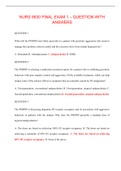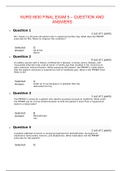NURS 6630 FINAL EXAM 1 – QUESTION WITH ANSWERS (NURS 6630 FINAL EXAM 1 – QUESTION WITH ANSWERS)
Walden University
All 7 results
Sort by
NURS 6630 FINAL EXAM 1 – QUESTION WITH ANSWERS
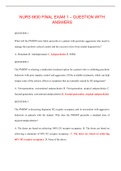
-
NURS 6630 FINAL EXAM 1 – QUESTION WITH ANSWERS/LATEST UPDATE/ RATED A+
- Exam (elaborations) • 26 pages • 2021
-
- $17.39
- + learn more
NURS 6630 FINAL EXAM 1 – QUESTION WITH ANSWERS QUESTION 1 What will the PMHNP most likely prescribe to a patient with psychotic aggression who needs to manage the top-down cortical control and the excessive drive from striatal hyperactivity? A. Stimulants B. Antidepressants C. Antipsychotics D. SSRIs QUESTION 2 The PMHNP is selecting a medication treatment option for a patient who is exhibiting psychotic behaviors with poor impulse control and aggression. Of the available treatments...
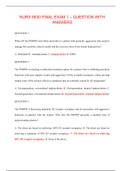
-
NURS 6630 FINAL EXAM 1 – QUESTION WITH ANSWERS (Graded A+)
- Exam (elaborations) • 26 pages • 2021
-
- $13.99
- + learn more
NURS 6630 FINAL EXAM 1 – QUESTION WITH ANSWERS QUESTION 1 What will the PMHNP most likely prescribe to a patient with psychotic aggression who needs to manage the top-down cortical control and the excessive drive from striatal hyperactivity? A. Stimulants B. Antidepressants C. Antipsychotics D. SSRIs QUESTION 2 The PMHNP is selecting a medication treatment option for a patient who is exhibiting psychotic behaviors with poor impulse control and aggression. Of the available treatments...
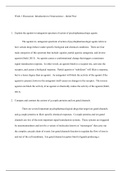
-
Introduction to Neuroscience—Initial Post 1. Explain the agonist-to-antagonist spectrum of action of psychopharmacologic agents. The agonist-to- antagonist spectrum of action of psychopharmacologic agents refers to how certain drugs behave under specifi
- Exam (elaborations) • 4 pages • 2021
-
- $8.99
- + learn more
Introduction to Neuroscience—Initial Post 1. Explain the agonist-to-antagonist spectrum of action of psychopharmacologic agents. The agonist-to- antagonist spectrum of action of psychopharmacologic agents refers to how certain drugs behave under specific biological and chemical conditions. There are four main categories of this spectrum that include: agonist, partial agonist, antagonist, and inverse agonist (Stahl, 2013). An agonist causes a conformational change that triggers a maximum ...
NURS FINAL EXAM 1 NURS FINAL EXAM 3 NURS FINAL EXAM 4 NURS FINAL EXAM 5
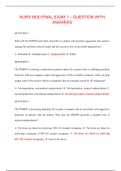
-
NURS 6630 FINAL EXAM 1 – QUESTION WITH ANSWERS(LATEST UPDATE)
- Exam (elaborations) • 26 pages • 2021
- Available in package deal
-
- $14.99
- 1x sold
- + learn more
NURS 6630 Final Exam (2018): Walden University – Question and Answers What will the PMHNP most likely prescribe to a patient with psychotic aggression who needs to manage the top-down cortical control and the excessive drive from striatal hyperactivity? The PMHNP is selecting a medication treatment option for a patient who is exhibiting psychotic behaviors with poor impulse control and aggression. Of the available treatments, which can help temper some of the adverse effects or symptoms th...
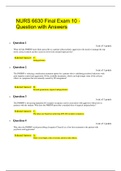
-
NURS 6630 Final Exam (75/75 Points)/(GRADED A)
- Exam (elaborations) • 17 pages • 2021
-
- $10.99
- + learn more
The PMHNP is caring for a patient with fibromyalgia. Which second-line treatment does the PMHNP select that may be effective for managing this patient’s pain? The PMHNP is working with the student to care for a patient with diabetic peripheral neuropathic pain. The student asks the PMHNP why SSRIs are not consistently useful in treating this particular patient’s pain. What is the best response by the PMHNP? A patient is being prescribed bupropion and is concerned about the side effects. What...

That summary you just bought made someone very happy. Also get paid weekly? Sell your study resources on Stuvia! Discover all about earning on Stuvia

